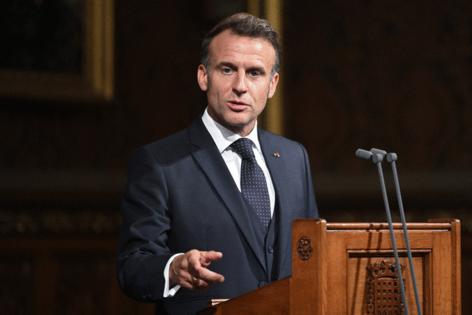Macron's continuity cabinet risks another government collapse
Published in News & Features
French President Emmanuel Macron’s decision to appointment a broadly unchanged cabinet sparked an immediate backlash from opposition parties, undermining Prime Minister Sebastien Lecornu’s chances of surviving a make-or-break week in parliament.
Most senior members from the cabinet of ousted premier Francois Bayrou were renamed to their posts in a clear continuation of Macron’s centrist policy aims. The president didn’t reappoint Eric Lombard as finance minister, but his replacement, Roland Lescure, is a close ally who previously ran the industry portfolio.
Far-right leader Marine Le Pen said in a social media post that Macron’s continuity was “pathetic” and leaves her National Rally party “speechless.” The Socialist Party, which holds a potential swing vote in the National Assembly, repeated warnings that it would support a motion to topple Lecornu unless he marks a clear adjustment in direction.
“Without a change in policy, the Socialists will censure,” Pierre Jouvet, a party spokesman, said on BFM TV Sunday evening. “We have a president and prime minister, who in truth and in principle don’t want to change anything.”
Lecornu, who governs without a majority in the National Assembly, faces the same intractable problem that sunk the premierships of his two predecessors: passing a budget through a fractured parliament that will likely include unpopular spending cuts and tax increases needed to rein in the largest deficit in the euro area.
Bayrou was forced to resign last month after losing a confidence vote over his plan for a sharp reduction in the deficit next year. In December last year, his predecessor, Michel Barnier, was also ousted over proposed budget cuts.
Lecornu will face a similar test this week as opposition groups have said they will trigger no-confidence votes as soon as he formally outlines his policy priorities in a speech to the National Assembly on Tuesday.
The political and fiscal difficulties since Macron’s ill-fated gamble on elections last year have triggered bouts of selloffs in French assets, pushing up the country’s borrowing costs compared to European peers.
The euro edged 0.2% lower to $1.1718 in early trading following Macron’s announcement amid broad-based demand for the dollar.
The country’s yield premium over German debt — a key proxy of fiscal risk — has widened to around 81 basis points from as low as 65 in August, before Bayrou announced he would risk a confidence vote at the National Assembly.
In addition to higher borrowing costs, the new government must also reckon with a deteriorating economic backdrop as businesses and households hold back on spending and investment amid the uncertainty.
Bayrou’s government managed to get a delayed 2025 budget adopted in February by offering concessions to Socialist lawmakers to convince enough of them to abstain in no-confidence votes.
But the center-left party ultimately turned against Bayrou and has since taken a tougher line in negotiations with Lecornu. Their demands include a slower pace of deficit reduction, the implementation of a wealth tax proposed by economist Gabriel Zucman and undoing Macron’s 2023 law to raise the retirement age.
Over the past few days, Socialist Party officials have said Lecornu’s proposed compromises are insufficient and won’t prevent them from backing a no-confidence vote
Macron and Lecornu’s picks for top jobs in the new government didn’t indicate the change of direction demanded by opposition parties. Bruno Retailleau remains at the interior ministry, Gerald Darmanin stays on as justice minister and former premier Elisabeth Borne — who managed Macron’s pension reform — was kept at education.
Amelie de Montchalin, who prepared the 2025 finance bill and Bayrou’s plans, will also remain in her post as budget minister.
The only surprise is the return of Bruno Le Maire, who will take the defense portfolio. But he served as finance minister for the first seven years of Macron’s presidency and is closely associated with its core policies.
“We made it clear to the Prime Minister: it’s either a break with the past or censure,” Jordan Bardella, leader of the far-right National Rally, said in a post on X. The new government “is decidedly all about continuity and absolutely nothing about the break with the past that the French people expect.”
Among Lecornu’s olive branches to opposition parties is a pledge not to use the constitutional tool known as Article 49.3 to bypass votes on financial bills in parliament.
While that may appease political parties in the short term, it means his ministers will have to cede more ground to lawmakers to secure the possibility of getting a majority to pass the 2026 budget.
If the government can survive the test of no-confidence votes this week, Lescure, the finance minister, will be plunged into the thick of budget negotiations over the next weeks. The 58-year-old is a close ally of Macron’s, having abandoned a career in finance to join in the president’s first election campaign in 2017.
Lescure went on to win a seat at the National Assembly, where he served as president of the economic affairs committee throughout Macron’s first term. In 2022, he was appointed industry minister, a post he held until the collapse of Barnier’s government.
He has at times been critical of Macron’s center-right allies and their proposals to clamp down on immigration. Lescure has also said that he briefly held a membership card at the socialist party in the 2000s, to support the presidential bid of Dominique Strauss-Kahn.
____
(With assistance from Matthew Burgess.)
©2025 Bloomberg L.P. Visit bloomberg.com. Distributed by Tribune Content Agency, LLC.







Comments